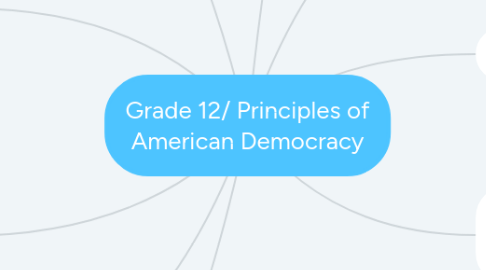
1. Fundamental Principles of Civil Society
1.1. Big Ideas: What is a civil society, and why do we want to have one? What are the limits of individual liberty? What are the dangers of majority rule? What is the role of religion in a democracy? How do government actions impact civil society?
1.1.1. Activity: (Individual) Following the PowerPoint lecture on the fundamental principles of civil society = Assignment: What is community service? Why Should You Participate in Community Service?Who would you like to help? o Helping Children and Schools: o Helping Senior Citizens: o Helping the Hungry and/or Homeless: o Helping Animals and the Environment: o Reducing Crime and Promoting Safety: o Promoting Community Enhancement: What kind of impact do you want to have? Do some research to see what projects you can do in your community.
2. The Three Branches of Government as Established by the U.S. Constitution
2.1. BIG IDEAS: Why does the Constitution both grant power and take it away? What is the most powerful branch of government? Why does it take so long for government to act?
2.1.1. Activity: Separation of Powers worksheet: students comprhend the system of checks and balances by filling out the individual powers of each branch and how they check each others power. After students complete the worksheet, engage in a class-wide discussion asking question such as: How does the separation of powers create political gridlock? and...After filling out your worksheet, which branch of our government do you feel is most powerful?
3. Interpreting the Constitution: The Work of the U.S. Supreme Court
3.1. BIG IDEAS: What is judicial review, and how does it work? What makes a law or action unconstitutional, and does that determination ever change?
3.1.1. Activity: After presenting a video on Marbury v. Madison (explaing the establishment of judicial review) students are given the primary source document for the Supreme Court decision in United States v. Eichman (which ruled the Flag Protection Act as unconstitutional) Students engage in a debate if they believe (or not) that flag burning/descicration should be protected under freedom of speech.
4. Federalism: Different levels of government
4.1. BIG IDEAS: Why are powers divided among different levels of government? What level of government is the most important to me—local, state, tribal,or federal? What level of government is the most powerful—local, state, tribal, or federal?
5. Comparative Governments and the Challenges of Democracy
5.1. BIG IDEAS: Do citizens have rights that the state must respect; if so, what are they? What is the role of civil dissent and when is it necessary? Why have some revolutions been followed by purges of dissidents, mass arrests of political opponents, murder of “class enemies,” suppression of free speech, abolition of private property, and attacks on religious groups? Why do authoritarian governments spy on their citizens and prevent them from emigrating? Why do they jail or harass critics of their government? Why is only one party allowed in an authoritarian state? Why do ordinary people risk their lives to flee or transform authoritarian states? How do individual countries combat terrorist organizations that do not recognize international norms or boundaries? How can individual citizens or nongovernmental organizations improve civil society? How can multina- tional alliances work together to combat climate change?
6. Fundamental Principles of American Democracy
6.1. BIG IDEAS: Why do we need a government? How much power should a government have over its citizens? What are the dangers of a democratic system? What do the terms liberty and equality mean, and how do they relate to each other?
6.1.1. ACTIVITY: Primary Source handout Federalist Paper 10 and Brutus 1. Federalists vs. Anti-Federalists. After reading each primary source document, complete a COMPARE/CONTRAST handout to understand the arguments on both sides. ***How much power should a government have over its citizens?
7. Rights and Responsibilities of Citizens in a Democracy
7.1. BIG IDEAS: What rights and responsibilities does a citizen have in a democracy? What does it mean to be a citizen? How can citizens improve a democracy?
7.1.1. ACTIVITY: Students engage with the Bill Of Rights = Students examine the personal freedoms outlined in the first 10 amendments to the Constitution. Group Discussions on the importance of these individual liberties & then tying them to how each member in the group can improve our democracy.

